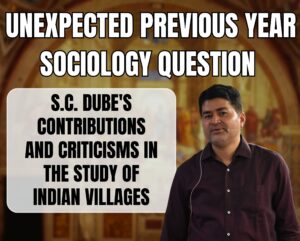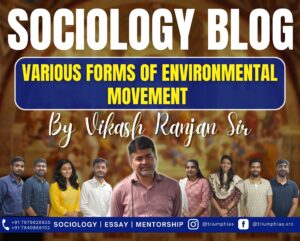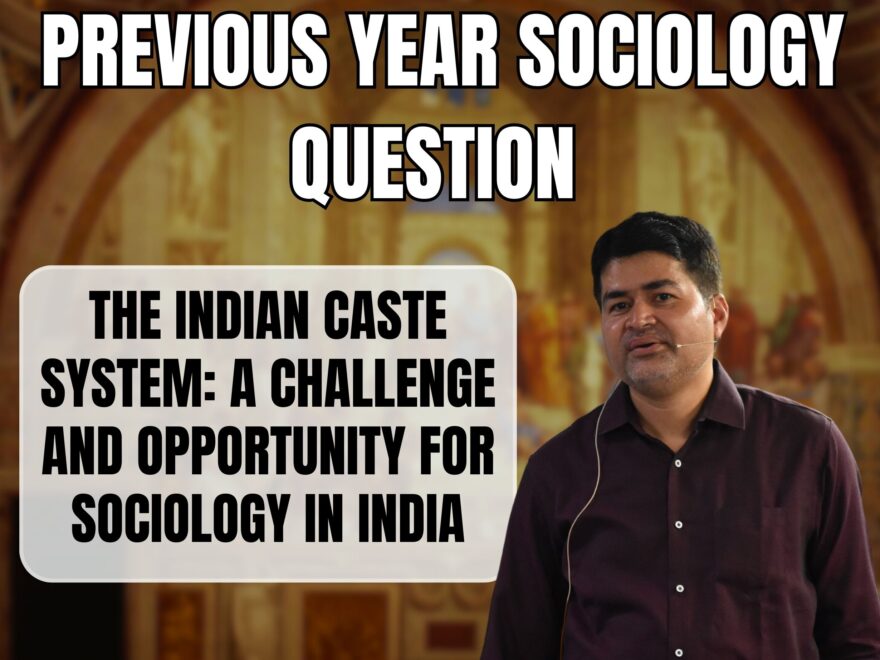“Indian Caste System is Unique and has been Unhealthy for the Growth of Sociology of India”? How do You Agree With the View?
(Paper: 2, Section: A, Year 2020, Unit 12: Social Structure, Caste System)

“Indian caste system is unique and has been unhealthy for the growth of Sociology of India”? How do you agree with the view?
(20 Marks)
| Introduction: Various Thinkers Studying Caste in Indian Sociological Tradition
Main Body: Listing Points Explaining Caste System Unhealthy for The Growth of Sociology of India, Counter View point Conclusion: Role of Sociologist in Social Justice |
Introduction
The Indian caste system is a complex and deeply entrenched social hierarchy that has existed for centuries. It has been both a subject of fascination and concern for sociologists studying India. It has a major part of studies of Indian sociology. Both Indian and foreign sociologists have studied caste from various perspectives. Louis Dumont, Ghurye, Andre Beteille, Oscar Lewis, Herbert Risley etc. Have studied caste from various perspectives.
Main Body
Caste system unhealthy for the growth of Sociology of India:
- Social Stratification and Inequality: The caste system creates a rigid social hierarchy with significant disparities in social status, access to resources, and opportunities. This stratification can hinder the development of a more equitable and inclusive society, which is essential for the growth of sociology.
- Social Stigma and Discrimination: The caste system has led to the marginalization and discrimination of lower-caste individuals, which can restrict their access to education and participation in sociological research. This exclusion limits the diversity of perspectives in sociological studies.
- Lack of Diversity In Subject Matter: majority of research is focused on caste and its dynamics and hence creates lack of diversity in subject matter. The issues of material inequality, gender, and other distresses in society are largely neglected.
- Religious and Cultural Influence: The caste system is deeply intertwined with religion and culture in India. This can sometimes inhibit critical analysis and discussions of the caste system within academic and sociological circles due to its sensitive and sacred nature.
- Limited Social Mobility: The rigid caste system can impede social mobility, making it difficult for individuals from lower castes to pursue higher education and careers in sociology. This limits the pool of potential sociologists and their ability to contribute to the field.
- Research Bias: The caste system can introduce bias into sociological research. Researchers from privileged castes may not fully understand or accurately represent the experiences of marginalized groups, affecting the quality and objectivity of sociological studies. M. N. Srinivas has highlighted the complexities and challenges posed by caste system in flied studies.
- Dalit sociologist labelling issues: sociologist from Dalit sections are not called as sociologists simply but labelled as Dalit sociologists and their studies are seen from biased viewpoint.
- Traditionalism vs. Progress: The persistence of the caste system reflects a certain level of traditionalism in Indian society. This can create resistance to social change and modernization, which are essential for the growth and evolution of sociology.
Counter arguments:
- Rich Sociological Material: The caste system has provided rich sociological material for scholars to study and analyse. It offers insights into issues of inequality, social stratification, discrimination, and social change, which are fundamental topics in sociology.
- Activism and Awareness: The existence of the caste system has spurred activism and awareness about social injustices. Sociologists have played a crucial role in advocating for social reform and equality, contributing significantly to the field’s growth.
- Diversity of Perspectives: While the caste system can be a source of bias, it also brings diverse perspectives to the field of sociology. Scholars from various caste backgrounds can provide unique insights into the complexities of Indian society.
- Evolution of the Field: Sociologists in India have increasingly focused on issues related to caste, leading to a more comprehensive understanding of its impact on various aspects of society. This has contributed to the field’s growth and relevance.
Conclusion
While the caste system in India has undoubtedly posed challenges to the growth of sociology, it has also offered valuable sociological material and opportunities for advocacy and reform. The role of sociologists in addressing caste-related issues and promoting social justice is essential for the discipline’s continued development and relevance in India. Therefore, the relationship between the caste system and the growth of sociology is multifaceted and not entirely detrimental.
Related Blogs …
 |
 |

To master these intricacies and fare well in the Sociology Optional Syllabus, aspiring sociologists might benefit from guidance by the Best Sociology Optional Teacher and participation in the Best Sociology Optional Coaching. These avenues provide comprehensive assistance, ensuring a solid understanding of sociology’s diverse methodologies and techniques.
META TAGS:
Indian Caste System, caste system sociology, caste system sociology upsc, Sociology in India, Social Stratification, Social Justice, Social Inequality, Discrimination, Sociological Research, Social Mobility, Dalit, Academic Bias, Social Reform, caste system in india in sociology, what is caste system ncert, jati in sociology, caste system sociology, caste system definition sociology, caste system sociology upsc, indian caste system in sociology slideshare, what is the caste system in indian society, caste system social classes
Why Vikash Ranjan’s Classes for Sociology?
Proper guidance and assistance are required to learn the skill of interlinking current happenings with the conventional topics. VIKASH RANJAN SIR at TRIUMPH IAS guides students according to the Recent Trends of UPSC, making him the Best Sociology Teacher for Sociology Optional UPSC.
At Triumph IAS, the Best Sociology Optional Coaching platform, we not only provide the best study material and applied classes for Sociology for IAS but also conduct regular assignments and class tests to assess candidates’ writing skills and understanding of the subject.
Choose The Best Sociology Optional Teacher for IAS Preparation?
At the beginning of the journey for Civil Services Examination preparation, many students face a pivotal decision – selecting their optional subject. Questions such as “which optional subject is the best?” and “which optional subject is the most scoring?” frequently come to mind. Choosing the right optional subject, like choosing the best sociology optional teacher, is a subjective yet vital step that requires a thoughtful decision based on facts. A misstep in this crucial decision can indeed prove disastrous.
Ever since the exam pattern was revamped in 2013, the UPSC has eliminated the need for a second optional subject. Now, candidates have to choose only one optional subject for the UPSC Mains, which has two papers of 250 marks each. One of the compelling choices for many has been the sociology optional. However, it’s strongly advised to decide on your optional subject for mains well ahead of time to get sufficient time to complete the syllabus. After all, most students score similarly in General Studies Papers; it’s the score in the optional subject & essay that contributes significantly to the final selection.
“A sound strategy does not rely solely on the popular
Opinion of toppers or famous YouTubers cum teachers.”
It requires understanding one’s ability, interest, and the relevance of the subject, not just for the exam but also for life in general. Hence, when selecting the best sociology teacher, one must consider the usefulness of sociology optional coaching in General Studies, Essay, and Personality Test.
The choice of the optional subject should be based on objective criteria, such as the nature, scope, and size of the syllabus, uniformity and stability in the question pattern, relevance of the syllabic content in daily life in society, and the availability of study material and guidance. For example, choosing the best sociology optional coaching can ensure access to top-quality study materials and experienced teachers. Always remember, the approach of the UPSC optional subject differs from your academic studies of subjects. Therefore, before settling for sociology optional, you need to analyze the syllabus, previous years’ pattern, subject requirements (be it ideal, visionary, numerical, conceptual theoretical), and your comfort level with the subject.
This decision marks a critical point in your UPSC – CSE journey, potentially determining your success in a career in IAS/Civil Services. Therefore, it’s crucial to choose wisely, whether it’s the optional subject or the best sociology optional teacher. Always base your decision on accurate facts, and never let your emotional biases guide your choices. After all, the search for the best sociology optional coaching is about finding the perfect fit for your unique academic needs and aspirations.
Follow us :


https://t.me/VikashRanjanSociology
Find More Blogs
|
Scope of the subject and comparison with other social sciences |
|||
|
|
|
|
Modernity and social changes in Europe |


One comment